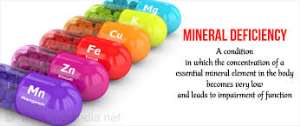
1. Magnesium
- Why it’s important: Plays an important role in mitochondrial function. Involved in many biochemical reactions in the body, helping maintain normal heart rhythm, immune system, and muscle function. Low magnesium levels are linked with a variety of conditions, including hypertension, heart disease, osteoporosis, and poorly controlled diabetes.
- Signs you could be deficient: Body odor, constipation, muscle cramps, insomnia, headaches, and fatigue.
- Foods that have it: Dark, leafy greens like spinach and swiss chard, nuts and seeds, mackerel, lima beans.
-
2. Phosphorus
- Why it’s important: A mineral and electrolyte. A key component of cells and bones and plays a large role in calcium regulation (healthy bones and teeth). Abnormal phosphorus can mean abnormalities in the bones, calcium, or in electrolyte balance.
- Signs you could be deficient: Loss of appetite, anxiety, bone pain, fragile bones, stiff joints, fatigue, irregular breathing, irritability, numbness, weakness, and weight change, according to the University of Maryland Medical Center.
- Foods that have it: Protein rich foods, such as meat, poultry, fish, eggs, dairy products, nuts, and legumes are good sources of phosphorus.
-
3. Zinc
- Why it’s important: Zinc is needed for normal growth, development, and sexual maturation, and helps regulate appetite, stress level, and sense of taste and smell. It also has antioxidant properties and plays an essential role in the immune system.
- Signs you could be deficient: Growth and development problems, hair loss, diarrhea, impotence, eye and skin conditions, and loss of appetite. Other symptoms may include weight loss, delayed wound healing, taste changes, and mental slowness.
- Foods that have it: Beef and lamb, liver, spinach, pumpkin and squash seeds, pork, chicken.
-
4. Calcium
- Why it’s important: A mineral and electrolyte found in your bones as well as in your blood. Crucial for maintaining proper nerve and heart function, blood clotting, and muscle contraction.
- Signs you could be deficient: Severe calcium deficiency can produce signs and symptoms of confusion and memory loss. A low blood calcium level can affect the functions of the nervous system and result in mental confusion, hallucinations, and delusions as well as memory loss, according to livestrong.com. Mood changes such as depression may also result.
- Foods that have it: Dairy products (milk, yogurt, and cheese), sardines, vegetables (Chinese cabbage, kale, and broccoli).
-
Moderation is key. Read this blog to learn about “The Dangers of Too Much Calcium”
5. Iron:
- Why it’s important: The tiny amount you need is crucial to normal body functions. If you do not have enough iron, your body cannot make hemoglobin, the oxygen-carrying component of red blood cells, and you may develop anemia, a disorder that occurs when there is not enough hemoglobin in the blood.
- Signs you could be deficient: Symptoms of anemia include: Feeling tired, difficulty breathing, dizziness, headaches, feeling cold.
- Foods that have it: Meat, seafood, poultry, beans, peas and dark, green leafy vegetables.




 Dumsor: Mathew Opoku Prempeh has been disrespectful, he should be fired – IES
Dumsor: Mathew Opoku Prempeh has been disrespectful, he should be fired – IES
 NPP prioritizing politics over power crisis solution — PR Strategist
NPP prioritizing politics over power crisis solution — PR Strategist
 E/R: Gory accidents kills 3 persons at Aseseaso, several others critically injur...
E/R: Gory accidents kills 3 persons at Aseseaso, several others critically injur...
 Nobody can come up with 'dumsor' timetable except Energy Minister – Osafo-Maafo
Nobody can come up with 'dumsor' timetable except Energy Minister – Osafo-Maafo
 Dumsor: You ‘the men’ find it difficult to draw timetable when ‘incompetent’ NDC...
Dumsor: You ‘the men’ find it difficult to draw timetable when ‘incompetent’ NDC...
 We’re working to restore supply after heavy rains caused outages in parts of Gre...
We’re working to restore supply after heavy rains caused outages in parts of Gre...
 NPP government plans to expand rail network to every region — Peter Amewu
NPP government plans to expand rail network to every region — Peter Amewu
 Dumsor must stop vigil part 2: We’ll choose how we demonstrate and who to partne...
Dumsor must stop vigil part 2: We’ll choose how we demonstrate and who to partne...
 2024 elections: NDC stands on the side of morality, truth; NPP isn't an option —...
2024 elections: NDC stands on the side of morality, truth; NPP isn't an option —...
 Akufo-Addo has moved Ghana from 'Beyond Aid' to ‘Beyond Borrowing’ — Haruna Idri...
Akufo-Addo has moved Ghana from 'Beyond Aid' to ‘Beyond Borrowing’ — Haruna Idri...
